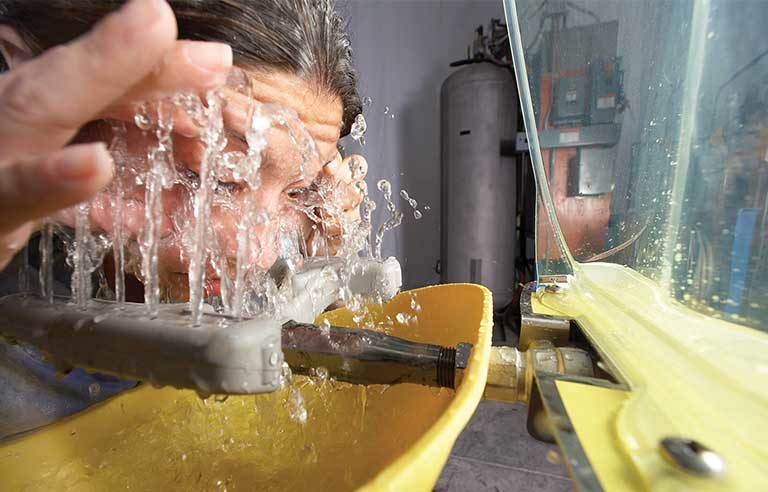Bacteria-free eyewash systems
I’m concerned about bacterial growth in my emergency shower/eyewash equipment. What proactive steps can I take to keep my equipment clean and free of bacteria?

Photo: Bradley Corp.
Responding is Ryan Pfund, senior product manager, Bradley Corp., Menomonee Falls, WI.
It’s extremely important to keep eye/facewash systems clean and free of bacteria. However, sometimes stagnant water can accumulate because of improper maintenance and testing, false activations, tampering, and other misuse by workers. This leaves equipment and water vulnerable to contamination.
Stagnant or untreated water is more likely to contain organisms (Acanthamoeba, Pseudomonas, or Legionella bacteria, for example) that cause infection. When a worker uses an eyewash station that’s improperly maintained, organisms in the water may come into contact with the eyes and/or skin or be inhaled, risking infection.
Contamination issues can be mitigated by improving equipment testing and maintenance, selecting equipment with safeguards against water contamination, and installing an eyewash alarm system. In particular:
Testing and maintenance. Weekly activation ensures nothing is blocking the flow of the flushing fluid and eliminates any chance of contamination from stagnant water. It’s important that all heads of the device are activated, including the eyewash or eye/facewash head, as well as the showerhead. Take time to flush lines long enough to clear the line of sediment and debris buildup. Self-contained units should also be visually inspected weekly. Inspection tags are often included with fixtures to document testing and satisfy a safety audit. Manufacturers offer a variety of specially designed devices to help assist in testing.
Eyewash designs for increased hygiene. A newer eye/facewash model uses a self-draining design that eliminates any settled water in the system. This model also incorporates separate supply and waste pipes to prevent cross-contamination from the clean inlet and wastewater. Another feature to look for is hinged see-through plastic or stainless steel bowl covers that shield the entire bowl from misuse and contamination. The see-through plastic allows for quick and easy visual inspection and the hinging mechanism provides a more secure hold. The fixture is activated as the cover is opened and may be installed on barrier-free fixtures.
Emergency signaling systems. Sometimes stagnant water is left over from false activations, tampering and other misuse by workers – leaving equipment vulnerable to contamination. Although hinged bowl covers can protect eyewashes from interfering with equipment, emergency signaling systems can alert facility staff when equipment is being activated and, therefore, deter unwanted tampering and potential contamination. Emergency signaling systems also help to quickly alert and mobilize emergency response teams to affected personnel who are using emergency safety showers and eye/facewash fixtures to improve response time and ensure the best safety outcome.
Finally, the COVID-19 pandemic illuminated the importance of cleaning and disinfecting work areas. According to the Centers for Disease Control and Prevention, pathogens can remain viable on surfaces for days. Therefore, routine cleaning of workspaces and high-touch surfaces such as handles, levers, switches, doorknobs, faucets and equipment should be disinfected with Environmental Protection Agency-registered disinfectants approved for the type of surface. EPA provides a list of registered products for disinfection, along with contact time and targeted pathogens. Employee training on the use of these powerful disinfectants is of utmost importance.
Editor's note: This article represents the independent views of the author and should not be considered a National Safety Council endorsement.
Post a comment to this article
Safety+Health welcomes comments that promote respectful dialogue. Please stay on topic. Comments that contain personal attacks, profanity or abusive language – or those aggressively promoting products or services – will be removed. We reserve the right to determine which comments violate our comment policy. (Anonymous comments are welcome; merely skip the “name” field in the comment box. An email address is required but will not be included with your comment.)

